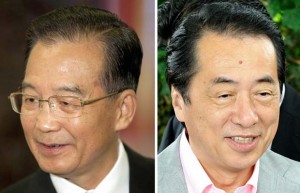
Since the September Senkaku (Diaoyu) Islands incident involving the Japanese coast guard and a Chinese fishing trawler in Japanese waters, the world’s 2nd and 3rd largest economies continue to experience strained relations On Monday October 25, Japan made yet another official protest to China, after its coast guard spotted two Chinese patrol ships in the vicinity of the Senkakus. The boats did not cross into Japanese territory, but were in Japan’s “contiguous zone“. Chief Cabinet Secretary Sengoku Yoshito, stated that this made Japan “uncomfortable”, and as a result, Tokyo reiterated its position on the islands:
“There is no doubt at all that the Senkaku Islands are an integral part of Japanese territory historically and under international law,” he said. “We are going to continue taking the necessary precautions and (conducting) surveillance.”
Further, Japan said it will add six submarines to its current fleet of 16 ,over the next 4 years, specifically to address increased Chinese patrols near their territorial waters.
Still, Japanese Prime Minister Kan Naoto held a brief meeting with Chinese Premier Wen Jiabao in Brussels in early October, and both countries had agreed to a formal discussions in late October during a meeting of the United States, Russia and 16 other Asian nations in Vietnam. However, things did not quite go as planned. Chinese foreign ministry officials accused Japanese diplomats of “making statements which violated China’s sovereignty”. As a result, Chinese Assistant Foreign Minister Hu Zhengyue, said the talks scheduled in Hanoi, had been ruined. In addition, he accused Japan of colluding with ASEAN nations against China, using the Senkaku incident as a rallying point, and also lying about China’s statements”. Much of this is typical CCP melodrama, but the point about Japan “colluding” with other nations in the region, is probably correct, as Japan and Washington are on the same page in regard to Chinese “containment. Maybe Mr. Hu was disquieted over this sort of rhetoric:
Hanoi has skillfully used the China card to court Japanese, Russian and American investors, with Tokyo confirming that it will seek so-called “rare earth” minerals in Vietnam after China was accused of cutting exports of the materials to Japan in response to a war of words over the arrest of a Chinese sea captain near the disputed Senkaku/Diaoyu Islands. Intel, Boeing and Microsoft all announced new investments and partnerships in Vietnam over the past week. The clear endorsement of the Obama administration was visible in the presence of US Secretary of State Hillary Clinton at the Boeing and Microsoft signings, after which she proposed US mediation in the China-Japan row, which is being closely watched in Southeast Asia. Spokespersons for both the Philippines and Indonesia told journalists in Hanoi that while ASEAN or its member states would not comment on bilateral issues between China and Japan, they expressed concern over the dispute.
On the hand, Japan has little choice in strengthening relations with Vietnam, because China is continuing to block rare earth minerals exports to Japan, as a form of punishment for attempting to arrest an aggressive fishing captain, who rammed Japanese security in Japanese territorial waters (yes, the incident actually happened in undisputed Japanese territory)! Rare earth elements are critical to production of various electronic components.
As a result, Wen Jiaboa refused to meet one-on-one with Kan Naoto. Due to concern over possible escalation, U.S. Secretary of State Hillary Rodham Clinton sought to mediate, proposing joint talks with China and Japan. China did meet with Secretary Clinton on Hainan Island on Saturday October 30th, but has not taken the U.S. up on its offer to arbitrate the dispute. In fact, China has rejected the offer. Beijing showing willingness to negotiate on an issue of Chinese sovereignty will be seen as weakness., and a loss of face to the Chinese public. Also, it is clear that the United States is not a unbiased party, especially after Obama Administration made its position on the Senkakus clear:
Though it has no position on the sovereignty claims, Mrs. Clinton said the United States viewed the islands as protected under the terms of its defense treaty with Japan, which means it will defend them from any foreign attack.
The response from Foreign Minister spokesman, Ma Zhaoxu was clearly not conciliatory:
China “will never accept any word or deed that includes the Diaoyu Islands within the scope” of the treaty.
The future does not seem to bright either, Japanese and Chinese leaders are not scheduled to meet during the upcoming Asia-Pacific Economic Cooperation (APEC) summit in Yokohama, Japan, November 13-14, nor the G-20 meeting in South Korea a few days before. The media focuses much attention on the “outrage” in the Chinese streets, much of which is scripted. However, China is not making many friends on the Japanese streets either:
It should be noted that 89 percent of the Japanese people surveyed said they felt anxious that China, backed by its economic and military power, would increase diplomatic pressure on other countries. Furthermore, 79 percent answered that they felt a military threat from China. The number is second only to the 81 percent who said they perceived such a threat from North Korea.